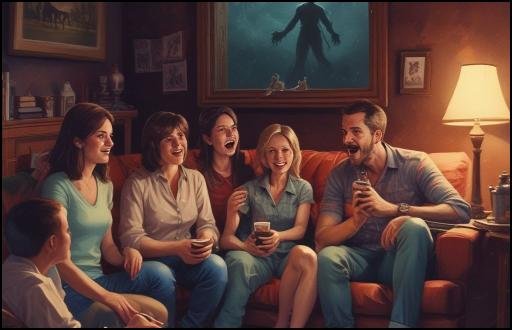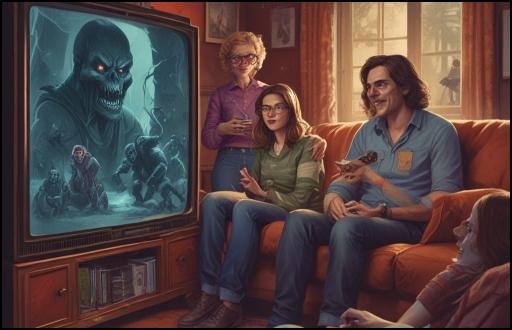It’s stress release for some horror movie buffs. For example, viewers of horror movies climbed during the height of the COVID-19 epidemic.
Hersey, Pa. — Good evening, bats and ghouls. Time to draw up a gravestone and steel yourselves for a maddeningly horrific Medical Minute, bursting with nutritious advice ahead of All Hall’s Eve and nerve-wracking news you can use.
Our scary topic matter experts will dig up the terrifying facts about fear this week. Is that object causing the hair on the rear of your neck to prickle? Is that haunting picture pushing you from your neighborhood movie or across your sofa to leap? Could it possibly be… beneficial for you?
Actually, says Penn State Health Milton S. Hershey Medical Center child psychiatrist Dr. Ramnarine Boodoo, it can be indeed.
“It’s called ‘the paradox of horror,’” Boodoo added, “because people generally try to avoid things that make them uncomfortable. Why then do people appreciate films with such horrible graphic violence?
One notion is that it helps with coping, he said.

From an evolutionary perspective, humans are equipped with deeply entrenched, unconscious processes that help them respond to stress. Think of it as a brain-wiring relic from the days when mankind were cave dwellers racing away from saber-tooth tigers.
For someone watching say, “The Exorcist,” “you have an activation of what’s called the sympathetic nervous system, which can cause things like an increased heart rate and breathing rate,” Boodoo added. “Sometimes it can cause pretty bad feelings of nausea. Sweating. It can often be sort of like a panic attack.”
Wait — this is a good thing?
“Well, in a weird way, yes,” Boodoo responded. Thankfully, not everyone has cause to take these reactions to real-life fear out for a real-life spin. But if someone is in a safe location and exposed to hypothetical fearful stimuli, the notion is that these fight-or-flight systems can kick in without someone in a hockey mask actually following them down the street with a chainsaw. And for some people, that’s … delightful. The same way a roller coaster provides amusement park fans a thrill.
Not only that, the notion says that it can aid with a person’s ability to cope with various kinds of stressful events. Real ones. You might not combat the zombie in real life, but your daily journey on the interstate might carry its own horrors.

Hannah Nam, a third-year medical student at Penn State College of Medicine, says terrifying movies and frightening stories can act like exposure treatment. Regularly encounter the same stimuli over and over for a period of time, and the fear might fade.
“You can apply these tactics to real-life scenarios,” she continued. “I also found that it can be a form of stress relief for some people.”
“Some people” is the operative word there. Make no mistake. Neither Nam nor Boodoo suggests watching horror films as therapy (even if his name contains the word BOO! in it, which simply sounds like a squandered chance). In fact, for some the movies are hazardous.
“Many studies have shown that consistent direct exposure — especially among young people — to graphic material, decreases empathy and increases aggression,” Boodoo added. “So, we really have to be careful with how much exposure we have to this kind of stimulus.”
Also, many people have lower trauma thresholds. Either they’ve been subjected to trauma themselves at some point in their lives or they’re just wired differently than your ordinary slasher-film lover. For these folks — especially young children — the benefits of horror aren’t there. People prone to paranoia and those with anxiety disorders or impulse-control problems may need to be vigilant. The same holds true for persons with heart or respiratory issues.
Take Boodoo. In amusement parks, he avoids the roller coasters. He also doesn’t leap off of aircraft. Horror flicks aren’t his idea of a good time. When he was growing up, a movie version of Stephen King’s “It” was just making the rounds. Boodoo caught a little of it.
“I couldn’t go to the bathroom by myself afterward, man,” he remarked. “It was bad.”
Nam is absolutely different. She enjoys a good scare. She and her pals gather frequently to watch movies with Freddy Krueger, the demonic figure with blades for fingertips in Wes Craven’s “Nightmare on Elm Street” series.

“There’s a community aspect of having something to talk about,” she remarked.
For some horror movie lovers, it’s a stress release. During the height of the COVID-19 pandemic, for example, viewership in horror movies increased. Being terrified can be a release valve for stored-up tension during situations of severe stress.
So, how can you determine the dividing line between individuals for whom horror flicks are wonderful fun and those for whom they’re bad news?
Both Nam and Boodoo convey empathy. Listen to your fellow viewers and really be sure everyone is on board. And explore with caution. Makes sure nobody needs to prove they’re brave and remember: terrible sentiments are no joke. If someone is uneasy, don’t be afraid to turn off “The Conjuring 2” and settle for “It’s the Great Pumpkin, Charlie Brown.”
And also, don’t disregard your mates who find sustenance in scary films. Blayne Waterloo, a digital content and design specialist in Penn State Health’s Office of Marketing and Communications, broadcasts a podcast about horror movies called “Ladies and Ligaments” and contributes as an editor to the legendary scary-movie magazine Fangoria.
“Horror allows us to exorcise our worst fears, sure,” she remarked. “But as someone who struggles with mental illness, horror is one of the only arenas where my struggles aren’t just depicted but depicted with empathy. There’s a lot about the genre that investigates the human condition in a way that might let viewers feel seen just as they are. The monsters on television aren’t merely manufactured for our nightmares — they’re often metaphors for the aspects of ourselves that society doesn’t think acceptable.”
“Horror embraces the flaws of being human in a way the world doesn’t give us room to explore,” she said, “and that’s beautiful.”
At the End of Horror:
Horror may offer surprising health benefits, from boosting adrenaline to easing stress. Embracing fear in moderation could support mental and physical well-being.











